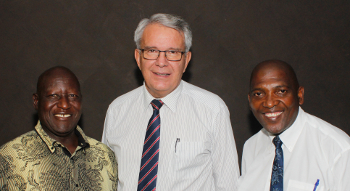Latest News Archive
Please select Category, Year, and then Month to display items
11 September 2024
|
Story Anthony Mthembu
|
Photo Anthony Mthembu and Chelsea Carolus
 From the left: Geraldine Lengau, Senior Officer in the Unit for Institutional Change at the UFS; and Oratile Reina, West College Prime.
From the left: Geraldine Lengau, Senior Officer in the Unit for Institutional Change at the UFS; and Oratile Reina, West College Prime.
As part of the initiatives lined up for College Week, the student leaders of West College at the University of the Free State (UFS) hosted a dialogue that primarily focused on discussing social justice as a value of Vision 130. The dialogue was held at Outeniqua Residence on 3 September 2024 and was well attended by students within West College.
According to Oratile Reina, West College Prime, “the motivation for the dialogue was to prepare newly elected leaders and our college community to align their efforts with Vision 130 – a vision that aims to create a more inclusive, equitable, and socially just environment on campus”. As such, she highlights that the dialogue was an opportunity for leaders to discuss practical strategies for implementing these values in their respective spaces, and to encourage those in West College to become better citizens inside and outside the university.
A conversation on social justice
The dialogue was facilitated by Geraldine Lengau, Senior Officer in the Unit for Institutional Change and Social Justice at the UFS. Lengau touched on several aspects pertaining to the topic of discussion. Firstly, she allowed the audience to give their definition of social justice, especially as students within the institution. In addition, she went on to talk to the audience about sexual assault in the context of social justice. In this instance, Lengau gauged whether the students knew which processes to follow in the event of a sexual assault incident, and whether they were acquainted with the UFS Sexual Harassment, Sexual Misconduct, and Sexual Violence Policy. Furthermore, the audience was given the opportunity to outline what social justice looks like to them in the spaces they occupy, including in their respective faculties, the sports they play, and the leadership structures they form part of. “I was encouraged to see that students take their right to a socially just university in very high regard, and that they were willing to break it down from what Vision 130 proposes, in order to align it with their common understanding,” said Lengau.
As the dialogue concluded, the audience signed a pledge committing to uphold the values of Vision 130. According to Reina, “The pledge represents a promise to take concrete steps towards fostering an inclusive and equitable campus culture. By signing the pledge, the leaders are not only agreeing to embody these principles in their leadership roles but are also holding themselves accountable to their peers and the broader university community.”
New developments in the Faculty of Theology and Religion
2017-08-30

Bishop JM Khumalo, Apostolic Church of
Christ; Prof Fanie Snyman, Dean of the
Faculty of Theology and Religion; and
Rev Simon Galada, Wesleyan Church,
at the faculty’s official opening in
February 2017.
Photo: Eugene Seegers
At a meeting of the UFS Council last year, a name change was accepted for the Faculty of Theology, renaming it to the Faculty of Theology and Religion. This change signals openness in approach to other religions, in addition to those of Christian denominations. This is a development that took root in Europe a few years ago. Furthermore, a growing field of interest is the study of the impact religion has had and still has, even in highly secularised societies. This name change is the first of its kind in South Africa, which means that the faculty will lead the way in transformation and impact-based religious studies.
Exciting times lie ahead
Prof Fanie Snyman, Dean of the faculty, says of these refinements: “The new name and restructuring of departments will lead to a new synergy that will have an impact on our teaching and research in the faculty. Exciting times lie ahead for the Faculty of Theology and Religion!”
Apart from the change in the name of the faculty, departments within the faculty were also regrouped, with new names. The Departments of Old Testament and New Testament merged to become the Department of Old and New Testament Studies, while the Departments of Systematic Theology and Ecclesiology merged and will now be known as the Department of Historical and Constructive Theology. The former Departments of Practical Theology and Missiology became the Department of Practical and Missional Theology. The Department of Religion Studies remained unchanged to emphasise the importance of religion in South Africa and the world at large.
Error! Hyperlink reference not valid.
Distinction of theological disciplines
The rationale for these groupings is the distinction of theological disciplines in terms of the study of texts (Old and New Testament), sources (Systematic Theology and Church History), and practices (Practical Theology and Missiology). One benefit of these newly-constructed departments is that they will be more cost-effective, but the more important advantage is that this will stimulate discussion and research across the various theological disciplines.